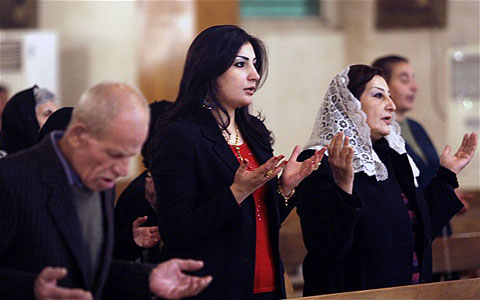We will all lose if Christians flee the Middle East
We will all lose if Christians flee the Middle East –
By Archbishop Louis Raphael Sako –

For almost two millennia Christian communities have lived in Iraq, Syria, Egypt and elsewhere in the Middle East. These groups have contributed economically, politically, and intellectually, and have helped shape their respective cultures. Unfortunately, in the 21st century Middle Eastern Christians are being severely persecuted. When they have the means, many are fleeing the region.
This exodus and its causes, largely ignored in the West, constitute a growing crisis with both humanitarian and security implications. In most of these countries, Islamist extremists see Christians as an obstacle to their plans. Some nations, dominated by extremist ideas, do not want so-called “Arab Spring” democracy. Freedom and pluralism are dangerous to them and their goals.
Unfortunately, some in the West are encouraging the emigration of Christians. Each month families in good economic situations leave for good. Many young Christians, especially those who are well educated, are fleeing. For example, the United Nations Committee for Refugees recently estimated that 850,000 Iraqi Christians have left since 2003. This is an immense loss for those who stay, as well as for Iraqi culture and politics.
The current situation is all the more tragic because Christianity has its roots in the Middle East. In Palestine, Syria, Lebanon, Iraq, and Egypt, Christians were a majority in the region well before of the arrival of Islam. At the time of the Arab conquest, Jews and Christians were treated as minorities under the protection of Islam.
Indeed, the early Umayyad period was marked by a tolerant attitude. Muslims needed the Christians’ administrative and economic knowledge to rule the newly conquered territories. For example, John of Damascus was one of the earliest and most influential Christian theologians on Islam. He and his father are believed to have served as administrators in the Umayyad caliphate. John, a saint of the Catholic Church, was educated in arithmetic, geometry, theology, music, and astronomy.
Later, Syriac Christians commissioned by the caliphs undertook huge systematic translations – especially in the fields of science, philosophy, and medicine – from Greek via Syriac into Arabic. The transmission of the great classics to Islamic civilization expanded the intellectual possibilities of the Muslim world.
Today, Christian communities lend to the region plurality and diversity. The loss of Christianity would fundamentally alter the contours of culture and society in nations such as Iraq, Syria, and Egypt. It would deal a severe blow to any hope of pluralism and democracy.
Unfortunately, many Muslims do not know the history of Christians in the religious and intellectual formation of Islamic civilization, or the value of Christianity to stable democracy. It is vital that these factors become better known, and their significance to Islam better understood.
It is also critical that Muslims not only reject violence against Christians, but actually to promote civil harmony and religious freedom in their societies. Most Muslims are good and not violent. They do not agree with the extremists but they are also afraid to act publicly. They must do so.
I invite our Muslim friends in the Middle East to bring a common action to “a Common Word”.
For their part, Christians in the Middle East should hold fast to their ancient homelands, maintain their historic presence, and not flee to the West. They must continue their witness, and permit their difficulties and suffering to be a sign of hope and peace for their fellow citizens.
We Christians must also find answers to the questions of Muslims as our fathers did during the Ommiad and Abbasid periods. We must find a new and more comprehensible theological language in Arabic to help Muslims understand our faith.
I suggest that the Church produce a new document, addressed to Muslims, that will clarify both our fears and our hopes. Among other things, this document should explain, in language compatible with Islam, the magnificent doctrine of religious freedom as it is articulated in the Declaration on Religious Freedom from the Second Vatican Council. Such an undertaking can help Muslims better understand our faith, and why religious freedom is vital to every person and every society.
Two weeks ago, Pope Francis met with 10 heads of Middle Eastern churches. He told us the Roman Catholic Church “would not accept” a Middle East without Christians. No one should accept such a catastrophic outcome. The entire international community should insist that Christians remain in the Middle East, not simply as minorities, but as citizens enjoying full equality under the law, and therefore in a position to continue to contribute to peace, justice, and stability.
Patriarch Louis Sako is the Chaldean Catholic Patriarch of Babylon. This editorial is adapted from a speech he will give at a Rome conference on “Christianity and Freedom,” sponsored by Georgetown University’s Religious Freedom Project
THE TELEGRAPH
